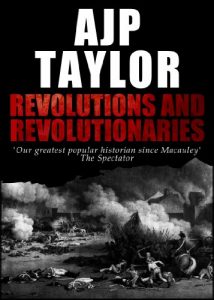It was the great age of revolutions - and revolutionaries.
From the fall of the Bastille to the storming of the Winter Palace in Moscow, Europe was rocked by violent upheavals and dominated by insurrections.
But why were some revolutions successful while other failed?
Why were some regime overthrown while others survived?
And what were the characteristics that allowed some leaders to seize and hold power whilst others were defeated?
In this masterful short history, AJP Taylor examines the age of revolution.
It starts with the fall of the Bastille and ends with the establishment of Bolshevik rule in Russia. Earlier revolutions had sought to change the ruler or the dynasty. The French revolution was the first and the Bolshevik revolution the last that was designed to transform the entire social and political order.
After surveying the great French revolution, Taylor moves on to Chartism — the British revolution that never was. He then looks at the social and national revolutions of 1848 when European history, in Trevelyan's phrase, reached its turning point and failed to turn.
The sixty years after this saw revolutionaries without a revolution — Marx, Engels, Bakunin, the First and Second Internationals. Only the Paris Commune provided a short-lived exception.
In 1917 the Bolshevik seizure of power seemed to presage a new wave of revolutions but outside Russia the revolutionary impulse in Europe flagged and died. And now the inheritors of Europe's revolutionary tradition are now to be found in other continents.
'Revolutions and Revolutionaries' is a brilliant study of one of the great themes of European history by one of the greatest writers on the subject.
Praise for AJP Taylor:
`The most readable, sceptical and original of modern historians' — Michael Foot
'Anything Mr Taylor writes is worth reading ... he is our greatest popular historian since Macaulay' - The Spectator
'His informal, pithy style makes the book compelling - even exciting - reading' The Irish Times
A.J.P. Taylor (1906-90) was one of the most controversial historians of the twentieth century. He served as a lecturer at the Universities of Manchester, Oxford, and London. Taylor was significant both for the controversy his work on Germany and the Second World War engendered and for his role in the development of history on television. His books include 'War By Timetable', ‘How Wars Begin’, ‘How Wars End’ and ‘The War Lords’.
Endeavour Press is the UK's leading independent publisher of digital books.
From the fall of the Bastille to the storming of the Winter Palace in Moscow, Europe was rocked by violent upheavals and dominated by insurrections.
But why were some revolutions successful while other failed?
Why were some regime overthrown while others survived?
And what were the characteristics that allowed some leaders to seize and hold power whilst others were defeated?
In this masterful short history, AJP Taylor examines the age of revolution.
It starts with the fall of the Bastille and ends with the establishment of Bolshevik rule in Russia. Earlier revolutions had sought to change the ruler or the dynasty. The French revolution was the first and the Bolshevik revolution the last that was designed to transform the entire social and political order.
After surveying the great French revolution, Taylor moves on to Chartism — the British revolution that never was. He then looks at the social and national revolutions of 1848 when European history, in Trevelyan's phrase, reached its turning point and failed to turn.
The sixty years after this saw revolutionaries without a revolution — Marx, Engels, Bakunin, the First and Second Internationals. Only the Paris Commune provided a short-lived exception.
In 1917 the Bolshevik seizure of power seemed to presage a new wave of revolutions but outside Russia the revolutionary impulse in Europe flagged and died. And now the inheritors of Europe's revolutionary tradition are now to be found in other continents.
'Revolutions and Revolutionaries' is a brilliant study of one of the great themes of European history by one of the greatest writers on the subject.
Praise for AJP Taylor:
`The most readable, sceptical and original of modern historians' — Michael Foot
'Anything Mr Taylor writes is worth reading ... he is our greatest popular historian since Macaulay' - The Spectator
'His informal, pithy style makes the book compelling - even exciting - reading' The Irish Times
A.J.P. Taylor (1906-90) was one of the most controversial historians of the twentieth century. He served as a lecturer at the Universities of Manchester, Oxford, and London. Taylor was significant both for the controversy his work on Germany and the Second World War engendered and for his role in the development of history on television. His books include 'War By Timetable', ‘How Wars Begin’, ‘How Wars End’ and ‘The War Lords’.
Endeavour Press is the UK's leading independent publisher of digital books.






